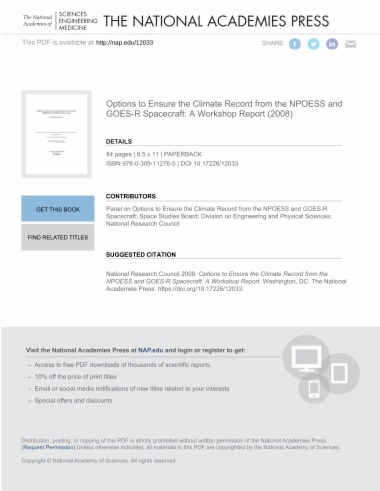In 2000, the nation’s next-generation National Polar-orbiting Operational Environmental Satellite System (NPOESS) program anticipated purchasing six satellites for $6.5 billion, with a first launch in 2008. By November 2005, however, it became apparent that NPOESS would overrun its cost estimates by at least 25 percent.
In June 2006, the planned acquisition of six spacecraft was reduced to four, the launch of the first spacecraft was delayed until 2013, and several sensors were canceled or descoped in capability.
To examine the impacts of these changes, particularly those associated with climate research, and ways to mitigate those impacts, NASA and NOAA asked the NRC to add this task to its ongoing "decadal survey," Earth Science and Applications from Space. The sponsors and the NRC agreed to address this task separately and to base its analysis on a major workshop.
This book presents summaries of discussions at the workshop, which included sessions on the measurements and sensors originally planned for NPOESS and GOES-R; generation of climate data records; mitigation options, including the role of international partners; and cross-cutting issues.
- Cover
- Front Matter
- Summary
- 1 Implications of the NPOESS Nunn-McCurdy Certification and the Descoping of GOES-R
- 2 Summary of the Workshop Sessions
- 3 Cross-Cutting Issues
- Appendix A: Statement of Task
- Appendix B: Workshop Agenda
- Appendix C: Mitigation Approaches Presented by NASA and NOAA at the Workshop
- Appendix D: Abbreviations and Acronyms
- Appendix E: Biographical Sketches of Panel Members

